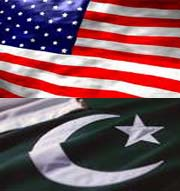 The US Government has offered a series of apologies to Islamabad for airstrikes and cross-border raids that killed Pakistani soldiers. General David Petraeus, the US commander in Afghanistan, said coalition forces "deeply regretted" the "loss of life". Anne Patterson, the US ambassador to Islamabad, cited the importance of “Pakistan’s brave security forces”. The chairman of the US Joint Chiefs of Staff, Admiral Mike Mullen, chairman of the Joint Chiefs of Staff, offered a private apology to the head of Pakistan’s military, General Ashfaq Parvez Kayani, in a telephone call.
The US Government has offered a series of apologies to Islamabad for airstrikes and cross-border raids that killed Pakistani soldiers. General David Petraeus, the US commander in Afghanistan, said coalition forces "deeply regretted" the "loss of life". Anne Patterson, the US ambassador to Islamabad, cited the importance of “Pakistan’s brave security forces”. The chairman of the US Joint Chiefs of Staff, Admiral Mike Mullen, chairman of the Joint Chiefs of Staff, offered a private apology to the head of Pakistan’s military, General Ashfaq Parvez Kayani, in a telephone call.
In the understatement of the year, "American and NATO officials said privately that the Pakistani government’s closing of a crucial border crossing might have made it easier for militants to attack backed-up tanker trucks carrying fuel through Pakistan to Afghanistan to support the American war effort".
Yet I'm not sure, at least from the account in The New York Times, how fulsome the US apology is. The emphasis of the story is, yeah, yeah, stuff happens, but let's get over it. A NATO official is quoted, “The best thing we could do is to strip away as many of the relatively smaller things as possible so we can focus on the big issues. And crazy as it may seem, the border crossing is a relatively small issue, compared to the others.”
And, before getting to the apologies, the Times article is reinforcing the "big picture" that got the US into trouble in the first place, when its helicopters took out the wrong people:
The overall commander of forces in Afghanistan, Gen. David H. Petraeus, has been pulling out all the stops — aggressively using the American troop buildup, greatly expanding Special Operations raids (as many as a dozen commando raids a night) and pressing the Central Intelligence Agency to ramp up Predator and Reaper drone operations in Pakistan.
He has also, through the not-so-veiled threat of cross-border ground operations, put pressure on the Pakistani Army to pursue militants in the tribal areas even as the army has continued to struggle with relief from the catastrophic floods this summer.
The sense of "let's see who really is to blame" is amplified by a Wall Street Journal article from Tuesday which continues to reverberate --- it is cited in the Times report --- in American circles:
The U.S. and Afghanistan have sought to persuade midlevel Taliban commanders to lay down their weapons in exchange for jobs or cash. The most recent Afghan effort at starting a peace process took place this week in Kabul.
But few Taliban have given up the fight, officials say. Some Taliban commanders and U.S. officials say militant leaders are being pressured by officers from Pakistan's Inter-Services Intelligence agency not to surrender.
And it's notable how quickly the media has gotten hold of a White House report --- featured in EA today --- condemning Pakistan's lax attitude toward fighting the insurgency.
Certainly Islamabad is, at best, taking its time before accepting US apologies as sincere. Abdul Basit, Pakistan's foreign ministry spokesman, said on Thursday that authorities were still evaluating the situation and a decision to reopen the Torkham crossing to NATO tankers, supplying troops in Afghanistan, will be taken "in due course".